Ijraset Journal For Research in Applied Science and Engineering Technology
- Home / Ijraset
- On This Page
- Abstract
- Introduction
- Conclusion
- References
- Copyright
Problems and Challenges Faced By Franchise Model
Authors: Yatin Bamnoliya, Rudra Vyas, Bhavya Satyadev, Nandakishore Nair, Mitulsinh Chavda, Anish Patel, Prathmesh Parmar, Sarthak Ruia
DOI Link: https://doi.org/10.22214/ijraset.2024.59040
Certificate: View Certificate
Abstract
This research report titled \"Problems and Challenges faced by Franchise Model\" delves into the intricacies of the franchise business model, it is aiming to know the problems and challenges faced by franchisee, to know how franchisee taker tackled problems and challenges, to know which kind of strategy use franchise taker for marketing and improvement. The study employs a descriptive and research design with a focus on individual franchise holders in Ahmedabad, utilizing primary data collection methods such as Google Forms and personal interviews. Secondary data from previous research papers and magazines supplements the analysis. Statistical tools like Microsoft Excel 2021, SPSS, and Google Forms aid in data analysis. Despite constraints like limited time and geographic scope, the study offers valuable insights for stakeholders in the franchise industry. Findings from this research can enhance operational efficiency, inform decision-making, and contribute to sustainable growth within the franchise model. In conclusion, while operating a franchise presents various challenges, strategic focus on areas such as maintaining consistency in quality, investing in training and skill development, and enhancing online presence can greatly contribute to success. Franchisees who prioritize adherence to brand standards, adaptability to local markets, and foster strong relationships with both franchisors and employees stand a better chance of overcoming barriers and thriving in their businesses.
Introduction
I. INTRODUCTION
Franchise has become an increasingly popular business model around the world but with great things comes problem and challenges. There are many problem and challenges faced by the franchisee holder like reduction in profit , high operating cost , meeting customer expectation. However, like any business model, there are several problems and challenges that franchisees may face when operating within a franchise system. In the study we well take swot analysis of the franchise taker and we will find the solution for the franchise taker. One common challenge faced by franchisees is the lack of control over certain aspects of their business. Franchise agreements typically include strict guidelines and operational procedures that franchisees must adhere to in order to maintain consistency across the franchise network. This lack of autonomy can be frustrating for some franchisees who may have different ideas or approaches to running their business. Another challenge faced by franchisees is the financial investment required to start and maintain a franchise. While franchising offers the advantage of a proven business model and brand recognition, franchisees often need to pay significant upfront fees, ongoing royalties, and other costs associated with operating within the franchise system. This financial burden can be a barrier for some potential franchisees, especially for those looking to start their first business. Additionally, franchisees may face challenges related to competition within the franchise network. Depending on the size and structure of the franchise system, franchisees may find themselves competing with other franchisees for customers, resources, and territory. This can create tension and conflict within the network, making it difficult for franchisees to thrive and succeed. Finally, franchisees may also face challenges related to support and communication from the franchisor. Effective communication and support from the franchisor are essential for franchisees to succeed, but some franchise systems may lack the necessary resources or infrastructure to provide adequate assistance to their franchisees. This can leave franchisees feeling isolated and unsupported, making it harder for them to navigate the challenges of running a franchise business. Overall, while the franchise model offers many advantages, it is important for potential franchisees to be aware of the potential problems and challenges they may face when entering into a franchise agreement. By understanding these challenges and taking steps to address them, franchisees can increase their chances of success within the franchise system. The journey of a franchisee is a multi-faceted expedition, marked by financial considerations, brand alignment, competitive dynamics, and external uncertainties. Successful franchise ownership requires a nuanced approach, blending entrepreneurial spirit with a commitment to the established framework.
As franchise takers navigate these challenges, they contribute not only to their individual success but also to the resilience and evolution of the broader franchise ecosystem.
II. OBJECTIVES
- To know the problems and challenges faced by franchisee
- To know how franchisee taker tackled problems and challenges
- To know which kind of strategy use franchise taker for marketing and improvement.
III. LITREATURE REVIEW
The literature review on problems and challenges faced by the franchise model highlights key issues such as lack of control over business aspects, financial burdens, and operational constraints within franchise agreements. Franchisees often struggle with maintaining consistency, high operating costs, and meeting customer expectations. Research emphasizes the need for understanding franchisee challenges to enhance operational efficiency and sustainable growth. Studies like Mohd Faizal Abdul Ghani et al.'s exploration of franchising growth factors provide valuable insights for both franchisors and franchisees in improving performance and overcoming obstacles in the franchising industry. n a recent study, Pethers and colleagues (2021) utilized simulation techniques to tackle operational issues in a franchise resale store, focusing on issues like long queues and customer dissatisfaction. The research involved surveying 176 individuals and analyzing data to improve operational efficiency. Sonali Deepak Raje (2022) delved into the world of food franchising in Mumbai, examining both the positive aspects and challenges faced by franchisors and franchisees. By employing a mix of research methods, the study provided valuable insights into the food franchising industry in Mumbai, offering suggestions for enhancing performance and addressing challenges.
IV. RESEARCH METHODOLOGY
Research Methodology is a way to explain how a researcher should carry out his intent research. It's a logical, systematic plan to resolve a research problem. A researchers details found out through the research methodology on a particular concept selected must be valid and reliable towards its aim and objectives. It is important to ensure that what data is going to be collected and from where, and also how it’s being collected and analysed.
A. Scope of the study
The scope of the study is Franchise Takers reciting in Ahmedabad City. We will contacting them, who purchase a franchise within year it will be beneficial for franchise takers. The research will give an insight about problem and challenges faced by franchise model.
B. Need of the study
Studying problems and challenges faced by the franchise model is crucial for businesses and researchers to understand potential pitfalls, enhance operational efficiency, and devise strategies for sustainable growth. It helps identify issues such as franchisee dissatisfaction, inconsistent brand representation, legal complexities, and market competition, ultimately contributing to the development of effective solutions and informed decision-making within the franchise industry. Studying problems and challenges faced by the franchise model is crucial for businesses and researchers to understand potential pitfalls, enhance operational efficiency, and devise strategies for sustainable growth. It helps identify issues such as franchisee dissatisfaction, inconsistent brand representation, legal complexities, and market competition, ultimately contributing to the development of effective solutions and informed decision-making within the franchise model.
- Research design:- Descriptive research design
Sampling design
- population elements : individual holding any type of franchise
- elements: one franchise holders
- Sampling frame: franchises from Ahmedabad
- sampling size: 150
- Sampling method: non-probability convenience
C. Data Collection Sources
- Primary data is collected through google forms and personal interviews of the samples.
- Secondary data is collected from previous research papers and magazines.
D. Statistical Tools
Microsoft Excel 2021, SPSS and Google Forms is used for data analysis. For the measurement and analysis of the information gathered, appropriate mathematical and statistical techniques used.
E. Limitation of the study
- Limited time:- The most unavoidable limitation lies in this study is the limited time constraint for conducting the research, as we got a time limit of 2 months it was not possible to conduct a detailed collection of data from throughout India.
- Lack of respondents:-The major another problem is lack of respondents it is hard to get the respondents for the survey and it is the long process to convince respondents.
- Limited geographic area:- The study is limited to the city of Ahmedabad.
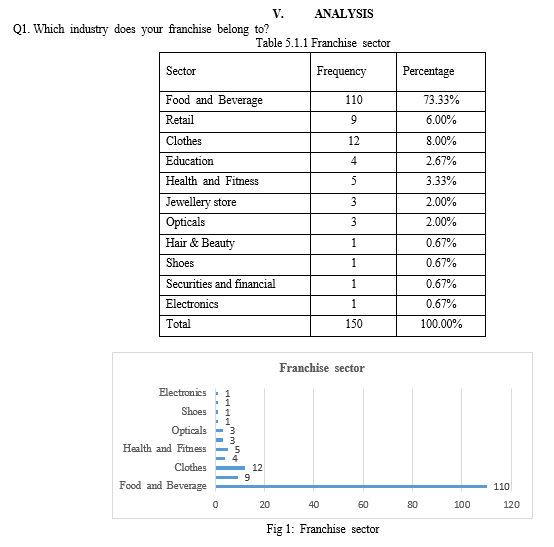

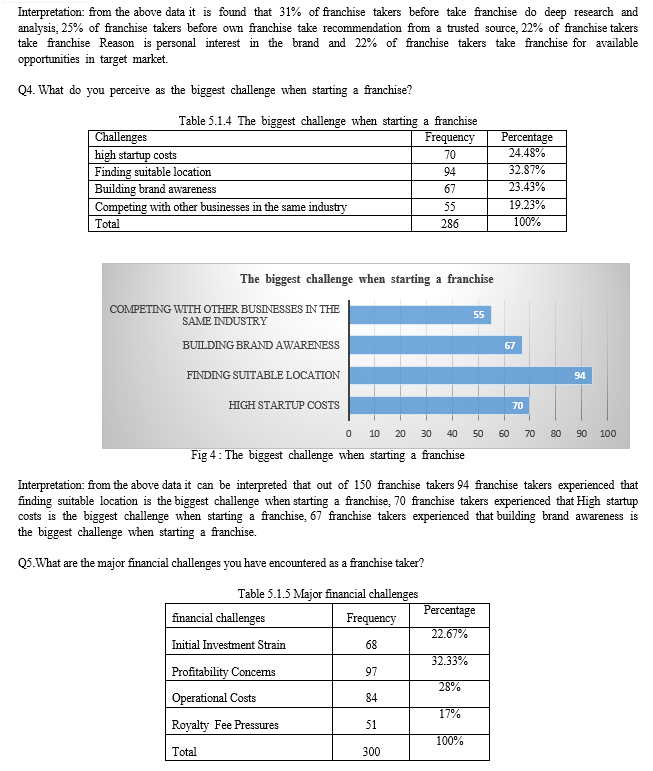

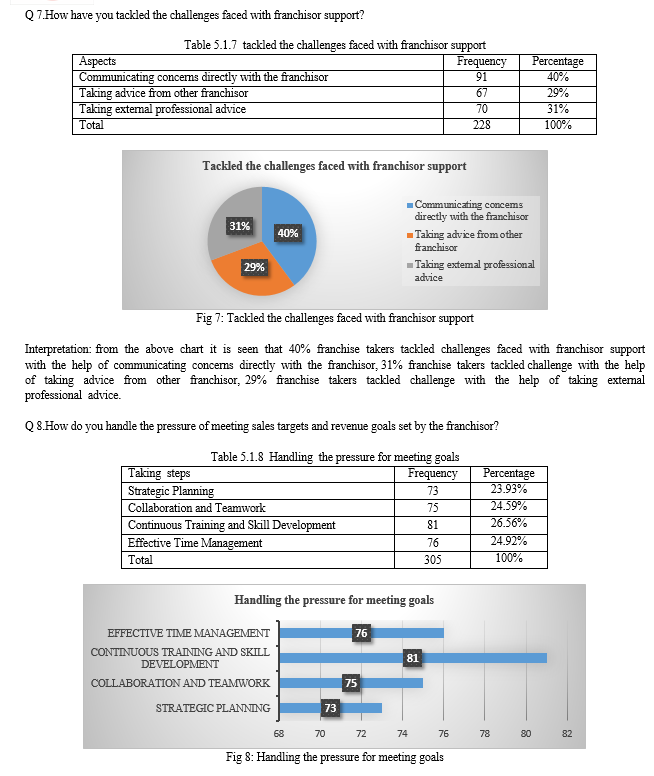
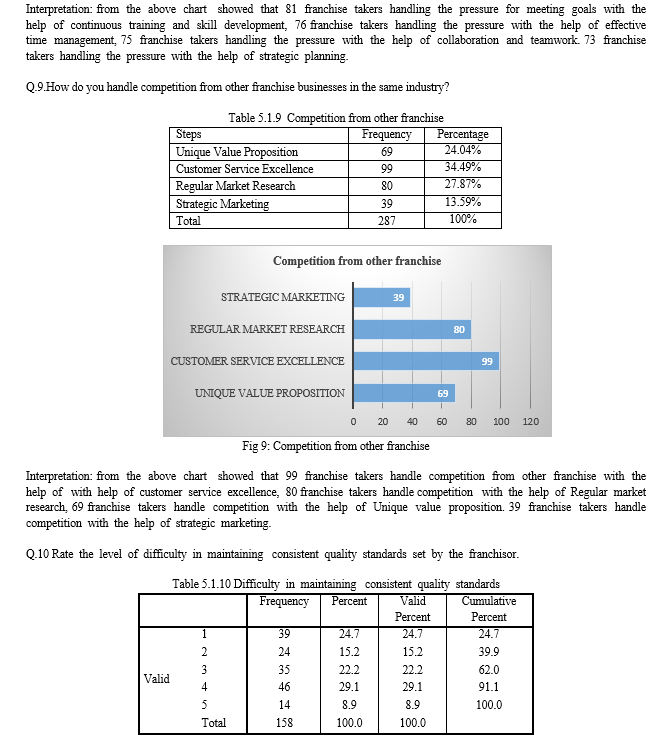
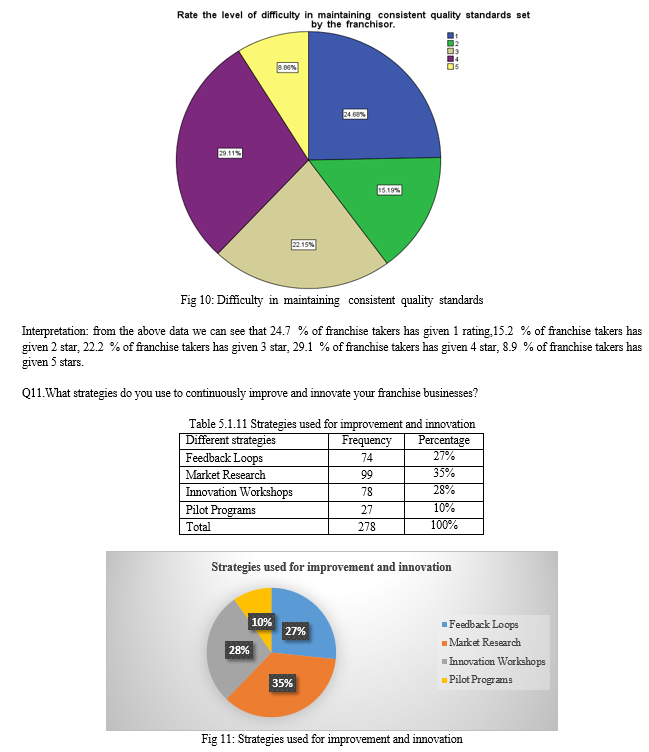


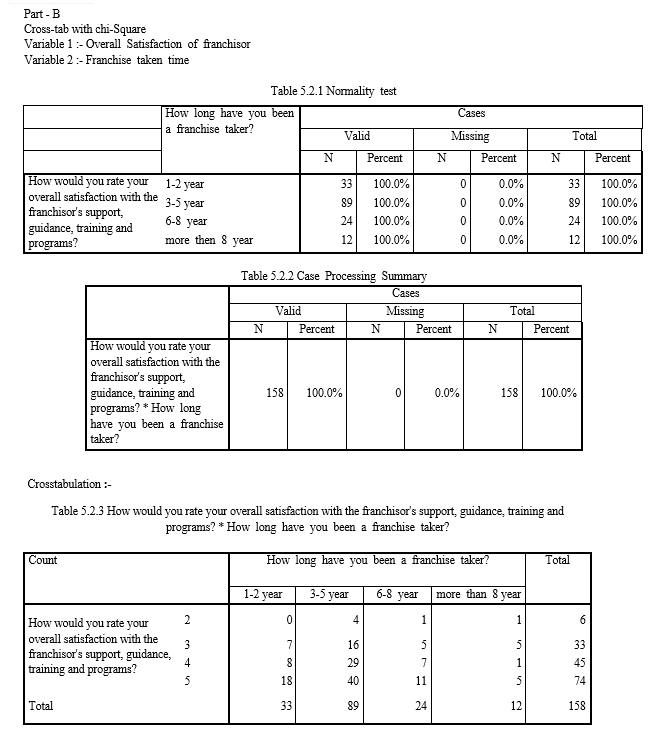

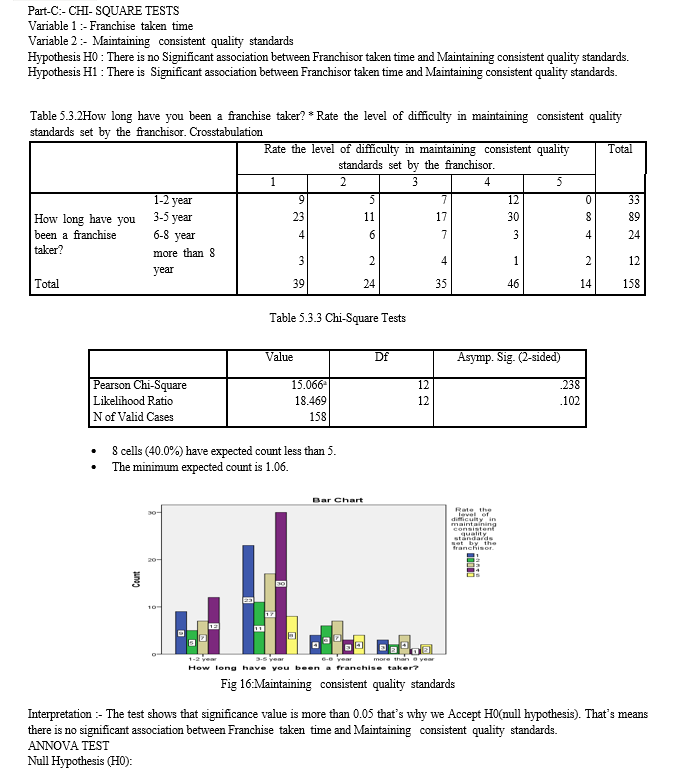

VI. FINDINGS
Data clearly show that most of franchise taker take Food and Beverages franchises.
Survey data show that commonly franchise taken time is 3-5 years and 7.6% franchiser holding franchise more than 8 years. Opportunity for growth and profit is most motivational factor taking franchise and also 31% franchise taker motivated to Desire to be their own boss. Franchiser to select particular brad franchise before some aspect to be consideration such as Available opportunities in target market, Personal interest in the brand, Recommendation from a trusted source and do deep research and analysis. the biggest challenge when starting a franchise is Finding suitable location and high startup costs. Major financial challenges in franchise models include is Profitability Concerns, Operational Costs and Initial Investment Strain. Major challenges in staffing and hiring suitable employees for franchises are hard to find the right people, keeping employees around and other franchisers snatching talent. Most of franchise taker tackled challenges by Communicating concerns directly with the franchisor and Taking external professional advice. Most of franchise taker handle the pressure of meeting sales targets and revenue goals by continuous training and skill development, Effective time management and collaboration & teamwork. franchise business taker deal with economic fluctuations and market uncertainties by monitor market trends and Flexible budget plan. Franchise taker handle competition from other franchise businesses in the same industry by customer service excellence, Regular market research and unique value proposition .Franchise taker faced difficulty in maintaining consistent quality standards. Market research, innovation workshops and Feedback loops this strategies uses by franchise taker to continuously improve and innovate their business. Most of the franchise owner use online presence, promotional offer and local advertisement for promoting there franchise and it is the efficient way for it. The mostly primary problem faced by franchisees in meeting customer expectations are Difficulty in adapting to changing customer preferences and Inconsistent product/service quality across locations. Most of franchise have problem with limited funds for marketing and advertising, reduced ability to invest in necessary equipment and resources while giving high franchise fee. advantages of choosing a franchise model for a business are Access to an established brand and customer base are Ongoing support and training from the franchisor. High-quality products or services, Convenient location, Excellent customer service and Competitive pricing are the elements contribute to a satisfying franchise experience. Most of the people are overall satisfied with the franchisor's support, guidance, training and programs.
VII. ACKNOWLEDGEMENT
Getting this opportunity, we are glad to express our sincere and profound sentimental of gratitude to all those who rendered their valuable help for the successful completion of this project report entitled “Problems and Challenges faced by Franchise Model ”. We are also thankful to all for sharing their veracious and illuminating views on the issues related to the project. We would also like to thank Dr. Smruti Vakil, under the guidance of whom we are able to grab this opportunity and get the chance to showcase this report in engrossing and fascinating manner. Our authentic sense of gratitude goes to GLS University that gave us a chance to illuminate us academic talents and qualifications.
Conclusion
Having a franchise means you are in the business by yourself, but of course, it is not without its difficulties. The franchisees encounter difficulties in several fields that include finance, management, and brand management. Even though these barriers are great, their understanding and being strategic about them may be of great help to the franchisees in reaching success. The findings revealed that franchise taker focused on such area as consistency in quality, training and skill development and online presence. Through rigorous evaluating of franchise openings, getting enough money, following brand standards while adjusting to local markets, and building strong links with both franchisors and employees, franchisees can increase the prospect of overcoming these difficulties and having successful businesses.
References
[1] Marie Doherty, Anne, Xiaomin Chen, and Nicholas Alexander. \"The franchise relationship in China: Agency and institutional theory perspectives.\"European Journal of Marketing.9/10 (2014): 1664-1689. [2] Nabatov, Alexey. \"Challenges and Opportunities of Multi-unit Franchising in Fast-food Industry. Franchisee’s Perspective.\" theseus.fi (2014) [3] Alpeza, Mirela, Aleksandar Erceg, and Sun?ica Oberman Peterka. \"Development of franchising in Croatia obstacles and policy recommendations.\"Review of Innovation and Competitiveness: A Journal of Economic and Social Research1.1 (2015): 5-24. [4] Matsoso, Mamorena, and Olumide Henrie Benedict. \"Critical success factors towards the implementation of total quality management in small medium enterprises: a comparative study of franchise and manufacturing businesses in Cape Town.\" Investment Management and Financial Innovations, Volume 12, Issue 3, 2015 [5] Sié, Laurent, Timothy Pett, and Ian Hipkin. \"Exploring franchise system development in France.\"Journal of Business Venturing Insights 4 (2015): 14-19 [6] (2002) The IEEE website. [Online]. Available: http://www.ieee.org/ [7] Oko, AE Ndu, and R. V. Okonkwo. \"Franchise Relationship in Nigeria: Implicit Challenges to Role Performance as Franchisor.\" researchgate.net (2015). [8] Affes, Habib. \"The role of normative expectations of franchisees in assessing the quality of franchisor-franchisee dyadic relationship.\" Journal of internet banking and commerce 21.2 (2016): 1. [9] Artanti, Yessy, Nindria Untarini, and Mr Sanaji. \"Strategies for Avoiding Business, Failure of Local Franchise.\" Social Sciences, Humanities and Economics Conference (SoSHEC 2017). Atlantis Press, 2017. [10] Shumba, Knowledge, Stanislous Zindiye, and Gift Donga. \"Challenges faced by franchise entrepreneurs operating in a volatile business environment: a case of the fast food industry in Harare, Zimbabwe.\" Problems and perspectives in management 15, Iss. 2 (cont. 2) (2017): 436-444. [11] Navarro Sanfelix, Guillermo, and Francisco Puig. \"New challenges in franchisor-franchisee relationship. An analysis from agency theory perspective.\" Addi (2017). [12] Zajko, Katja, and Barbara Brada? Hojnik. \"Social franchising model as a scaling strategy for ICT reuse: A case study of an international franchise.\"Sustainability10.9 (2018): 3144. [13] Langenmayr, Theresa. \"Implementation of Strategic Change by Franchisees: A Sensemaking Perspective.\" Junior Management Science 4.2 (2019): 173-194. [14] Giudici, Alessandro, et al. \"Successful scaling in social franchising: The case of Impact Hub.\" Entrepreneurship Theory and Practice 44.2 (2020): 288-314. [15] Samsudin, Fauziah, and Sazali Abdul Wahab. \"Sustainable development in franchising: Measuring the impacts of strategic direction in franchise organization.\" Retrieved March 31 (2018): 2020. [16] Dogru, Tarik, et al. \"Acquisitions and shareholders\' returns in restaurant firms: The effects of free cash flow, growth opportunities, and franchising.\" International Journal of Hospitality Management 84 (2020): 102327. [17] Roberts, Robin, et al. \"Understanding cultural diversity in franchising: Recommendations and implications for recruitment of migrant franchisees.\" Entrepreneurial Opportunities: Economics and Sustainability for Future Growth. Emerald Publishing Limited,(2020). 53-71. [18] Pham, Nga. \"Developing a franchise marketing plan for KOKORO Sushi restaurant.\" theseus.fi (2020). [19] Subawa, Nyoman Sri, Ni Wayan Widhiasthini, and Ni Putu Intan Permatasari. \"Local brand franchise competition in the disruption era.\" International Journal of Productivity and Quality Management 31.4 (2020): 445-460. [20] Dung, Tran Thi Thuy. \"COVID-19 pandemic impact on Franchise industry and Franchise dispute resolution.\" Research Technologies of Pandemic Coronavirus Impact (RTCOV 2020). Atlantis Press, 2020. [21] Wong, Hua Siong. \"Issues and challenges of unregistered franchise business: A Malaysian legal perspective.\" Studies of Applied Economics 39.4 (2021). [22] Farida et al. \"Evaluation of critical success factor through HOT-FIT method for the implementation of e-KOlab (electronic consignation, franchise, organizational network) as a strategy to scale-up SMEs.\" Linguistics and Culture Review 5.S2 (2021): 1045-1060. [23] Abdul Ghani, Mohd Faizal, et al. \"A Preliminary Study: Exploring Franchising Growth Factors of Franchisor and Franchisee.\" Journal of Open Innovation: Technology, Market, and Complexity 8.3 (2022): 138. [24] Pethers, Caitlin, et al. \"Simulation Improves Service and Operations at a Franchise Resale Store.\" Industrial Engineering and Operations Management (IEOM), Monterrey, México, November 3 – 5, 2021 (2023). [25] Deepak, Raje Sonali. \"The Study of Franchising in Food Business Its Prospects Challenges with Special Reference to Mumbai City.\" shodhgangotri (2023).
Copyright
Copyright © 2024 Yatin Bamnoliya, Rudra Vyas, Bhavya Satyadev, Nandakishore Nair, Mitulsinh Chavda, Anish Patel, Prathmesh Parmar, Sarthak Ruia. This is an open access article distributed under the Creative Commons Attribution License, which permits unrestricted use, distribution, and reproduction in any medium, provided the original work is properly cited.

Download Paper
Paper Id : IJRASET59040
Publish Date : 2024-03-15
ISSN : 2321-9653
Publisher Name : IJRASET
DOI Link : Click Here
 Submit Paper Online
Submit Paper Online

